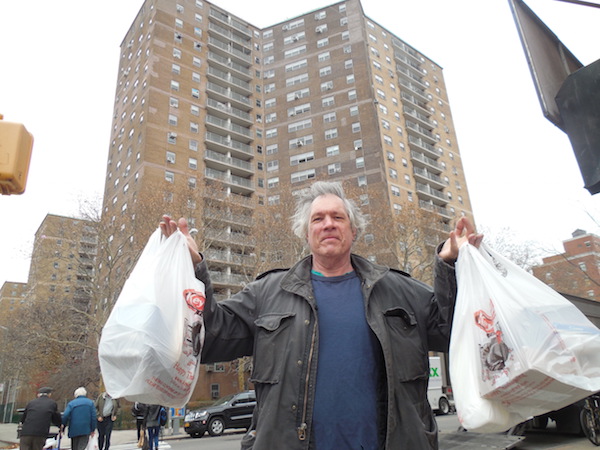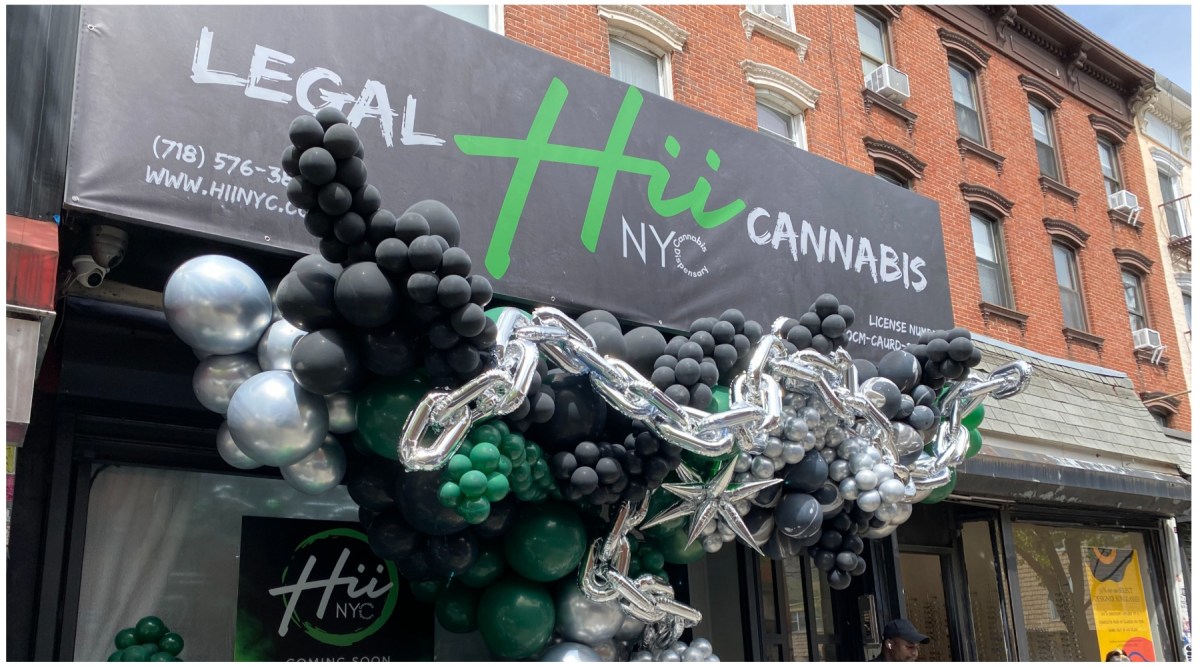
BY GERARD FLYNN | No doubt this Thanksgiving week, festive-minded New Yorkers will add significantly to the burden of the estimated 1,700 tons of plastic bags the city’s Department of Sanitation collects weekly.
But not everyone is buying into the proposal for a 10-cent fee on disposable plastic and paper bags in convenience stores, supermarkets and delis around the city, proposed recently in the City Council by co-sponsors Margaret Chin and Brad Lander. In fact, the proposal is causing progressive legislators to butt heads.
Dennis Phandular, for one, an East Village building superintendent who was rushing home weighed down with plastic bags full of Thanksgiving fare, thinks the idea is “silly.” He also doubts the bill, Intro 209, will pass.
Phandular thinks that reducing that waste need not take a herculean effort by the city.
“Plastic bags are a pain in the ass,” he said. “We are told to take bags but don’t need them. They are given to us. If someone behind the counter asked, ‘Do you want a bag?’ we might think twice.”
At a City Council hearing on the subject last week, Chin and Lander said that single-use plastic bags are costly, not just to city for having to clean them up and dispose of them, but also to the environment, polluting rivers and creating floating islands of waste in the oceans.
A 10-cent surcharge, they said, has been shown elsewhere to dramatically reduce the consumption of plastic bags and their waste, in nations as far off as Ireland, where a fee on plastic bags has reduced their use reportedly by 90 percent.
The merchants would keep the 10 cents. The regulation would not apply to food carts, pharmacies, wine and liquor stores, restaurants — due to limited alternatives for takeout and delivery — or for produce, milk and bulk food bags, to protect food from contamination.
The issue is dividing the City Council’s normally tight progressive caucus.
Councilmember Rosie Mendez’s East Side district borders Chin’s Lower Manhattan district.
Mendez opposes the proposal as it stands and in a statement to The Villager explained why: the onerous effect a 10-cent levy might have on the poor, senior citizens who live on a fixed income, dog walkers who need plastic bags to clean up after their canines and religious shoppers who separate food according to custom.
Needless to say, the plastic-bag manufacturers of America also oppose the proposed fee, calling it a “regressive tax.”
Longtime de Blasio ally and leftist Bertha Lewis, formerly of ACORN, told the City Council at last week’s hearing that she also opposes the proposal.
Lewis is the founder of the Black Leadership Action Committee (BLAC), which, it was revealed following the hearing, is funded by the American Progressive Bag Alliance (A.P.B.A.), an industry-funded group that has challenged similar legislation in other parts of the country.
Though not available for comment, her colleague LaMon Bland, a human rights lawyer, told The Villager the bag fee has not been adequately “thought through.”
“We are totally against it,” he said. “New Yorkers are already taxed enough.”
On top of his populist concern for onerous tax burdens on the citizenry, he said little in the way of community outreach has been done to educate the community on alternatives to the proposal, such as improved recycling programs, a position the environmentally conscious A.P.B.A. also champions, in addition to “correcting misperceptions concerning litter and waste.”
Bland wants the city to “consider adding more trash receptacles” and described the bag fee as a proposal that “may be flawed because there is no clear evidence a tax would decrease plastic bag usage.”
He shared Mendez’s concern about the proposal’s impact on struggling New Yorkers and said the “regressive tax” will have a “disproportionate impact on those of lower income.
“These individuals are more likely to go to the grocer more often than the affluent,” he noted. “They are walking home with bags that are likely to be double-bagged.”
And then there is the evidence about such a tax’s environmental impact.
“This approach may be flawed,” Bland said, “because there is no clear evidence a tax would decrease plastic bag usage.”
In fact, he said, “In some jurisdictions plastic bag usage increased.”
When asked to give an example, he balked, then said, “I don’t know offhand the exact location. I believe the city of San Mateo [California].”
Speaking earlier this month, Chin said, “While lobbyists for the plastic bag industry continue to attack our legislation with myths and misrepresentation, we’ve built a strong coalition of community-based environmental justice groups that are ready to help our city take a progressive step forward. Our coalition represents the working families that make New York great, and that’s why they see the benefits of a bill that will save millions in taxpayer funding and reduce plastic bag litter in our parks and neighborhoods. Let’s not allow the voices of working families — particularly those in our low-income, minority communities — to be silenced by the big money of plastic bag lobbyists.”
The legislation is supported by the Natural Resources Defense Council, Citizens Committee for New York City, New York League of Conservation Voters, New York City Environmental Justice Alliance, The Human Impacts Institute, Manhattan Solid Waste Advisory Board and Green Schools Alliance.
During the week of Dec. 8, the Citizens Committee will do a bag giveaway in Mendez’s district opposite the C-Town, at E. 12th St. and Avenue C, the go-to supermarket for many Alphabet City seniors on fixed incomes.
“We will distribute 200 reusable large cotton tote bags to grocery shoppers,” said spokesperson Saleen Shah. “Councilmember Mendez is still not on board with what we feel is a progressive and reasonable bill that supports the city’s environment and economy. We are still trying to get Rosie to be there to distribute bags.”

















